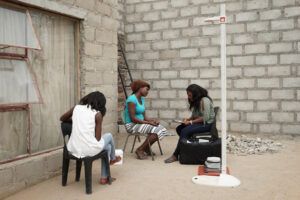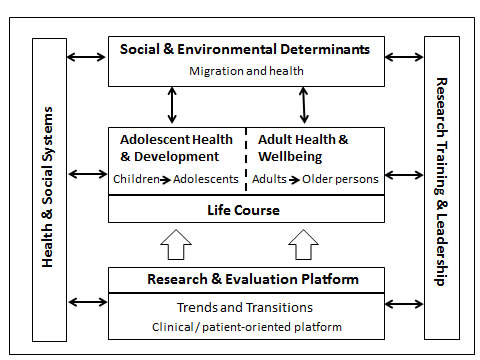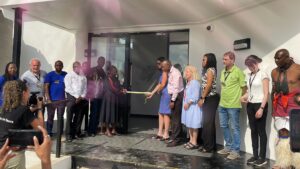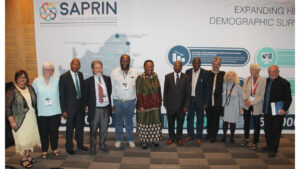 Agincourt research seeks local and national relevance and impact, while interacting with and contributing to important regional and global questions. The Unit’s priorities and the conduct of research are influenced by long-standing, respectful relationships with local communities; a future-oriented longitudinal perspective; and empirical findings that capture changing health and social dynamics.
Agincourt research seeks local and national relevance and impact, while interacting with and contributing to important regional and global questions. The Unit’s priorities and the conduct of research are influenced by long-standing, respectful relationships with local communities; a future-oriented longitudinal perspective; and empirical findings that capture changing health and social dynamics.
Broadly, all Unit research addresses four fundamental questions:
- The unpredictability and pace of evolving health, population and social transitions
- The interacting social and biological determinants and consequences – highlighting vulnerability and resilience – at key stages along the life course
- When, where and how to intervene most effectively
- The implications for health and social sector responses in order to achieve a more equitable and socially and economically productive society.
The figure below outlines an organisational framework showing major research areas and links between them over the past 5 years.

This figure illustrates key research foci and their prominence at stages of the life course.

*Size of dots indicate relative scale of work. *Respiratory pathogens: respiratory syncytial virus, influenza, tuberculosis
A HDSS PLATFORM
 Situated in resource-poor rural environments, the MRC/Wits-Agincourt Unit undertakes population-based health research to elucidate causal pathways, test interventions at key developmental stages across the life-course, inform health and social systems, and strengthen evidence to guide policy and programmes.
Situated in resource-poor rural environments, the MRC/Wits-Agincourt Unit undertakes population-based health research to elucidate causal pathways, test interventions at key developmental stages across the life-course, inform health and social systems, and strengthen evidence to guide policy and programmes.
This is facilitated by the Health and socio-Demographic Surveillance System (HDSS) platform, that covers a whole population cohort of ~116,000 persons in 31 adjacent villages, and which involves ongoing monitoring of all births, deaths and in- and out-migrations. This population data is linked to clinic and hospital records. Together, this provides an exceptional longitudinal platform for observational and intervention research along the life course, with special focus on children (respiratory infections, mortality), adolescents (HIV/AIDS, depression, NCD risk) and older adults (multi-morbidity, cognitive change). Focus on socio-environmental exposures (education, labour migration, socioeconomic status, natural resources, food security) interacts with emphasis on behaviour and physiological risk.
 As well as Wits University and SAMRC, the platform is supported by the Dept. of Science and Innovation (and hosted by the SAMRC) as one of five nodes of the South African Population Research Infrastructure Network (SAPRIN). This seeks to make a major local, provincial and national contribution to health and development through supporting the Dept. of Health and other ministries, as well as Statistics-South Africa and the Dept. of Planning, Monitoring and Evaluation.
As well as Wits University and SAMRC, the platform is supported by the Dept. of Science and Innovation (and hosted by the SAMRC) as one of five nodes of the South African Population Research Infrastructure Network (SAPRIN). This seeks to make a major local, provincial and national contribution to health and development through supporting the Dept. of Health and other ministries, as well as Statistics-South Africa and the Dept. of Planning, Monitoring and Evaluation.
IMPACT OF UNIT RESEARCH AS A RESPONSE TO SOUTH AFRICA’S CHALLENGES
The Unit’s primary base is in a rapidly transitioning rural setting 500km northeast of Johannesburg. Providing a counterpoint to South Africa’s urban bias, the Unit endeavours to bring the best science to bear in a context where populations carry much of the national burden of disease.
The Agincourt HDSS provides a platform for generating extremely high-resolution data leading to new knowledge, and presents opportunities for testing innovative methodology using the latest technology. The platform now covers genomic, physiological and clinical data, with nested studies, cohorts and trials along the life course. Technologies, until recently the preserve of urban or high-income societies, are central to several studies: smartphone app to deliver intervention against depression in adolescents; DXA measurements for osteoporosis; MRI scans for dementia.
Making well-characterised data available to research and policy communities is a priority. The Unit builds capacity of local staff, has a data intern programme, and supervises/mentors doctoral students, postdoctoral fellows, early and mid-career researchers. It provides leadership to sub-Saharan research networks, and partners with leading African, UK and US institutions.
Altogether, the Unit contributes unique, population-oriented insight to support health and development in rural South and southern Africa.
